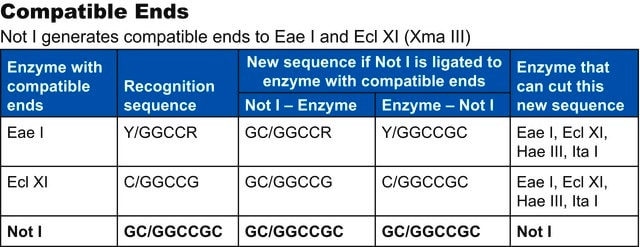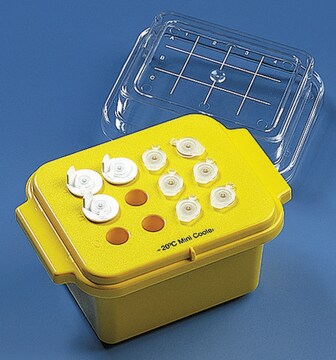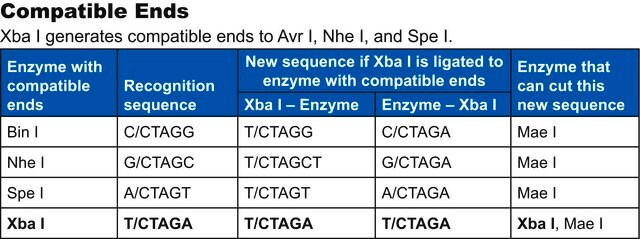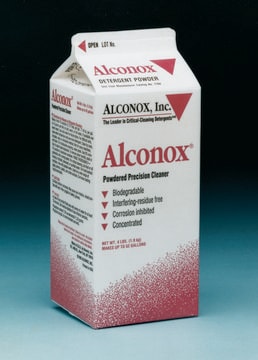BLNI-RO
Roche
Bln I (Avr II)
from Brevibacterium linens
About This Item
Empfohlene Produkte
Biologische Quelle
bacterial (Brevibacterium linens)
Qualitätsniveau
Form
solution
Spezifische Aktivität
10000 U/mL
Verpackung
pkg of 1,000 U (11558170001 [10 U/μl])
pkg of 200 U (11558161001 [10 U/μl])
Hersteller/Markenname
Roche
Parameter
37 °C optimum reaction temp.
Farbe
colorless
pH-Wert
8.1 (39 °F)
Löslichkeit
water: miscible
Eignung
suitable for molecular biology
Anwendung(en)
life science and biopharma
sample preparation
Fremdaktivität
Endonucleases, none detected (up to 20 U with MWM II-DNA)
Endonucleases, none detected (up to 20U with pBR 322-DNA)
Versandbedingung
dry ice
Lagertemp.
−20°C
Allgemeine Beschreibung
Compatible ends
Bln I ends are compatible with ends generated by Nhe I, Spe I and Xba I.
Isoschizomers
Bln I is an isoschizomer of Avr II.
Note: The complete 13 site Avr II restriction map of the E.coli genome has been reported.
Methylation sensitivity
The enzyme is not known to be affected by methylation.
Spezifität
CCTAGG
Restriction site: C↓CTAGG
C↓CTAGG
Heat inactivation: No inactivation of Bln I after incubation at 65 °C for 15 minutes.
Qualität
1 μg λDNA is incubated for 16 hours in 50 μl SuRE/Cut Buffer H with an excess of Bln I. The number of enzyme units which do not change the enzyme-specific pattern is stated in the certificate of analysis.
Absence of exonuclease activity
Approximately 5 μg [3H] labeled calf thymus DNA are incubated with 3 μl Bln I for 4 hours at +37°C in a total volume of 100 μl 50 mM Tris-HCl, 10 mM MgCl2, 1 mM Dithioerythritol, pH approximately 7.5. Under these conditions, no release of radioactivity is detectable, as stated in the certificate of analysis.
Typical ligation and recutting assay
Bln I fragments obtained by complete digestion of 1 μg λ × EcoR I DNA ligated for 16 hours at +4°C with 1 U T4 DNA Ligase in 10 μl buffer that contains 66 mM Tris-HCl, 5 mM MgCl2, 5 mM Dithiothreitol, 1 mM ATP, pH 7.5 (at +20°C). The percentages of product that can be ligated and subsequently recut with Bln I and EcoR I (yielding the typical pattern of λ × EcoR I × Bln I fragments) are stated under "Lig" and "Rec" in the certificate of analysis.
DNA-Profil
- λ: 2
- φX174: 0
- Ad2: 2
- M13mp7: 0
- M13mp18:0
- pBR322: 0
- pBR328: 0
- pUC18: 0
- SV40: 2
Einheitendefinition
Lagerung und Haltbarkeit
Hinweis zur Analyse
Bln I has been tested in Pulsed-Field Gel Electrophoresis (on bacterial chromosomes). For cleavage of genomic DNA (E.coli C 600) embedded in agarose for PFGE analysis, we recommend using 10 U of enzyme/μg DNA and 4 hour incubation.
The buffer in bold is recommended for optimal activity
- A: 25-50%
- B: 50-75%
- H: 100%
- L: 0-10%
- M: 25-50%
Sonstige Hinweise
Nur Kit-Komponenten
- Enzyme Solution
- SuRE/Cut Buffer H 10x concentrated
Lagerklassenschlüssel
12 - Non Combustible Liquids
WGK
WGK 1
Flammpunkt (°F)
does not flash
Flammpunkt (°C)
does not flash
Analysenzertifikate (COA)
Suchen Sie nach Analysenzertifikate (COA), indem Sie die Lot-/Chargennummer des Produkts eingeben. Lot- und Chargennummern sind auf dem Produktetikett hinter den Wörtern ‘Lot’ oder ‘Batch’ (Lot oder Charge) zu finden.
Besitzen Sie dieses Produkt bereits?
In der Dokumentenbibliothek finden Sie die Dokumentation zu den Produkten, die Sie kürzlich erworben haben.
Kunden haben sich ebenfalls angesehen
Artikel
The term “Restriction enzyme” originated from the studies of Enterobacteria phage λ (lambda phage) in the laboratories of Werner Arber and Matthew Meselson.
Unser Team von Wissenschaftlern verfügt über Erfahrung in allen Forschungsbereichen einschließlich Life Science, Materialwissenschaften, chemischer Synthese, Chromatographie, Analytik und vielen mehr..
Setzen Sie sich mit dem technischen Dienst in Verbindung.









